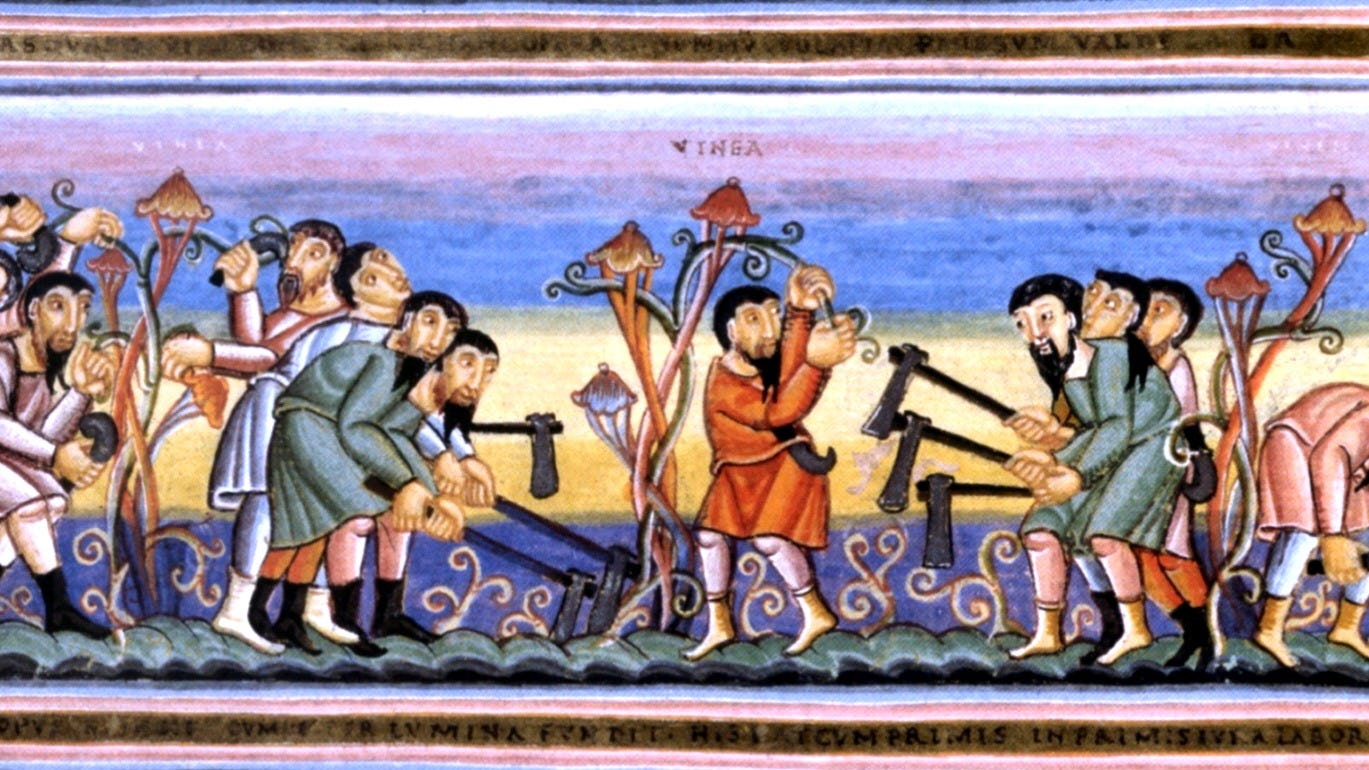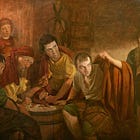Does your rank in the Church determine holiness and reward?
Vocations are indispensable for the Church—but they are a means to end. What is that end?

Vocations are indispensable for the Church—but they are a means to end. What is that end?
Editor’s Notes
Our Lord told the Parable of the Labourers in the Vineyard, read on Septuagesima Sunday, near the end of his ministry—shortly before his entry into Jerusalem.
It follows Christ’s promise of a hundredfold reward for those who leave all to follow Him, and comes immediately before the request of James and John for places of honour in the Kingdom.
In this piece, Fr. Coleridge tells us:
What the parable of the Labourers in the Vineyard reveals about the diverse vocations within the Church.
Why vocations are means to holiness, but that sanctity—and thus eternal reward—depends on charity, not rank.
How the highest vocations can be forfeited, and how latecomers may rise by God’s grace and faithfulness.
He shows us that divine rewards are not bound to status or rank, but to perseverance in love and fidelity.
The Labourers in the Vineyard
Part I: Is it unfair that 'the first will be last' in the Parable of the Labourers in the Vineyard?
Part II: Does your rank in the Church determine holiness and reward?
Part III: Why are good works worthless without charity?
Part IV: Why do so many who are called fall away?
The Labourers in the Vineyard
The Preaching of the Cross, Vol. III
Ch. XI, pp 195-200.
St. Matt. xix. 30, xx. 1–16; St. Mark x. 31
Story of the Gospels, § 127.
Burns and Oates, London, 1888
Headings and some line breaks added.
Sung on Septuagesima Sunday
Recap: Coleridge starts this section by referring back to Our Lord’s promise to St Peter and the apostles—a promise which was conditional on their perseverance:
‘And Jesus answering said, Amen I say to you, there is no man who hath left house, or brethren, or sisters, or father, or mother, or children, or lands, or wife, for the Kingdom of God’s sake, for My Name’s sake, for My sake and for the Gospel, who shall not receive much more in this present time, a hundred times as much, now in this time, houses, and brethren, and sisters, and mothers, and children, and lands, with persecutions, and in the world to come everlasting life.’
Order of vocations
But beyond the general law which makes all these great promises conditional on the perseverance of those to whom they are made, there is another rule of the Divine action which requires to be known in order to understand the matter perfectly.
The doctrine declared by our Lord in the context before us amounts to a statement of the different ‘vocations,’ as we call them, which were to be in the Christian Church. We have had to consider the elevation of marriage to a new dignity by our Lord, and, at the same time, the superior dignity of the virgin state. We have had before us the vocation to a state of Apostolical poverty, in the case of the rich young man.
The introduction of the question of St. Peter sets before us the whole ecclesiastical state, from the highest position in the hierarchy to the lowest. Some are called to govern and judge in the Church, others to be subjects and to obey.
Our Lord does not mention distinctly the religious state, but the opinion that the Apostles were already religious under vows has many supporters. And in any case the vocations already distinctly mentioned may be considered as bringing before the mind, as has been said, the whole system of the beautiful variety of vocations. In them some are higher, some are lower, all are beautiful, and all are the gift of God.
Vocations are not sanctity
But there was something more to be said about these vocations.
The rewards of the eternal life are not to be secured thereby by any fixed and hard rule, as if, for instance, all religious persons were to be higher than all secular persons, or all ecclesiastical before all laymen. The rewards of the eternal kingdom are distributed in proportion to the sanctity of those who are to be rewarded.
The vocations of which we are cognizant on earth are means to sanctity, they are not sanctity itself. One of the great Saints of the desert once desired to know his state before God, and he was made to know that he was equal to a poor artisan of Alexandria. The religious habit, the hierarchical mitre, do not raise of necessity those who wear them above the layman, the soldier, the merchant, or the labourer, who may win higher rewards in Heaven by faithfulness in their vocation and by charity.
Charity, held until the end and in the highest degree, is the one thing which will receive the highest reward, and by the mercy of God, charity is possible in the workshop and in the marketplace, as well as in the episcopal chair or in the cell of the recluse.
In this way there shall be first last, and the last first. Charity is the gift of God, and He may, if He chooses, give mighty graces in this way to those who seem externally the last in the Kingdom, and He may also give the grace of a very rapid increase in charity to those who come in late in the day to His service.
Want of charity is the cause of forfeit
It is not, therefore, without significance that our Lord has made the fall of the first comers turn upon a fault in this respect.
It may be that high vocations may be forfeited for any sin, as, for instance, it is thought that the ruin of Judas was brought about by his covetousness. But the state of soul in which Judas found himself, as to charity, is sufficiently evinced by his remarks upon the lavish magnificence of Magdalene in anointing our Lord.
Charity, at all events, is banished from the sinful soul in whatever vocation it may have been placed, and want of charity is most often the ruin of those who can stand firm against the temptations to the lower vices. That is, when such persons fall, it is usually thus.
So our Lord paints these the first comers as led astray by want of charity. Was their reward the less, because the others received an equal recompense? But they were angry at their being placed on an equality with themselves. This was enough to make them unfit for the favour of the great householder. And our Lord puts His reply on the ground of His freedom to do as He likes, though there might have been other grounds alleged. For those who came in at the eleventh hour came late for no fault of their own.
If they had been there at the earlier time, they might have come in with the first, but ‘no man hired them.’ Perhaps we are meant to learn that God will have no one question His right to confer favours on whom He pleases. He is just to all, but He may, if He chooses, be larger in His gifts in one case than in another.
But the evil eye He cannot abide. For the evil eye is inconsistent with charity. To such as those He will give no answer, no explanation, He will not reason with them as if there was anything to explain. In the action of God which is sketched in this parable there is perfect justice, as well as the exercise of the absolute freedom of God.
For, as has been said, it is charity alone which secures the reward of glory, and this charity may be found everywhere.
Jews and Gentiles
A large number of the interpreters of this parable consider that it is to be understood primarily of the rejection of the Jews and the admission of the Gentiles to the Kingdom.
There is no objection to this interpretation, if the parable is considered as prophetical. In fact, the act of God in His dealings with the Jews and with the Gentiles is an instance of the law which the parable illustrates, and an instance which must have been much on our Lord’s mind at this time.
Moreover, all the parables of this period have more or less a reference to the coming transfer of the gifts of God from the Jews to the Gentiles. It was the change for which our Lord was evidently anxious that the minds of the disciples should be prepared. They would be prepared for it by any parable which set forth the law of God’s action of which we speak.
And it is well to remember that nations and communities are the objects of God’s special favour as well as single persons, and that, as He first chose the Jews out of His pure love, and then rejected them on account of their opposition to the admission of the Gentiles into the Church, so He still continues from time to time dealing with families and with nations, preserving them in unity and the true faith when others fall away, and again withdrawing from them His favours and graces, and even the gift of faith, when He sees them disloyal to the law of charity.
This is the great trial of those who have been injured by others for the sake of religion, or of the law of God. They may maintain their faith and their virtue, but they are required to do more. They are required to forgive their injurers from their heart, on pain of forfeiting their own crown. In this way the first are made last, and the last first.
The great instance of course is that which has been mentioned, the case of the Jews. ‘Thou hast made them equal to us, who have borne the burden of the day and the heats,’ are words which might well have been used by some of those whom St. Paul had to remind ‘that God was the God of the Gentiles as well as the God of the Jews.’
But the operation of that law of God’s Kingdom, which fell so severely on the envious Jews, is not confined to the early ages of the Church, and it rules His dealings with individual souls as well as with once-favoured nations, wherever there is a temptation against charity which is not faithfully resisted.
St Paul himself
And our Lord may well also have had before His mind the rise, in the Church, within a few years from the time when He was speaking, of that great and chosen servant of His, the vessel of election, who was then altogether outside the numbers of His followers, and was soon to become the great persecutor of those who bore His name.
St. Paul was nevertheless to become the Apostle of the whole world, to labour, in one sense, more abundantly than all, and to take his place among the chosen band by the side of St. Peter himself.
And if the Blessed Twelve needed any lesson to teach them how to treat St. Paul, as soon as they became aware of his vocation to the Apostolate, which he received at the same time as his conversion, they would have been supplied with that instruction when they remembered this parable and the words with which it concludes.
And St. Paul himself can teach us how true it is that even the highest vocations in the Church are not safe, if there is a lack of charity.
In the next part, Fr. Coleridge will tell us:
That St Paul’s vocation, though extraordinary, would have been in vain without charity
Why the highest spiritual gifts and labours are worthless without the love of God and neighbour
How St Paul warns the Corinthians that divisions and jealousy can render great works fruitless—and how this applies to us today.
He will show us that the true measure of sanctity is not gifts or labours, but charity.
Find out in the next part—and hit SUBSCRIBE now to make sure you don’t miss anything from The Father Coleridge Reader:
The Labourers in the Vineyard
Part I: Is it unfair that 'the first will be last' in the Parable of the Labourers in the Vineyard?
Part II: Does your rank in the Church determine holiness and reward?
Part III: Why are good works worthless without charity?
Part IV: Why do so many who are called fall away?
Here’s why you should subscribe to The Father Coleridge Reader and, share it with others:
Fr Coleridge provides solid explanations of the entirety of the Gospel
His work is full of doctrine and piety, and is highly credible
He gives a clear trajectory of the life of Christ, its drama and all its stages—increasing our appreciation and admiration for the God-Man.
If more Catholics knew about works like Coleridge’s, other works based on sentimentality and dubious private revelations would be much less attractive.
But sourcing and curating the texts, cleaning up scans, and editing them for online reading is a labour of love, and takes a lot of time.
Will you lend us a hand and hit subscribe?
Read next:
Follow our projects on Twitter, YouTube and Telegram:






